
Events
Legislators from the Mississippi River Corridor Gather to for Annual MRLC Forum
September 26-28, 2024
On September 26-28, state legislators from throughout the Mississippi River region gathered in Minneapolis, Minnesota for the 2024 Mississippi River Legislative Caucus Annual Forum. The event brought together 15 legislators from seven of the 10 river states – Minnesota, Wisconsin, Illinois, Missouri, Tennessee, Mississippi and Louisiana.
The forum focused on topics including sustainable agriculture, green infrastructure and preparing urban areas for flooding, navigating the recent Supreme Court decisions, Clean Water State Revolving Fund and STORM Act funding for states, and opportunities for Mississippi River Agreements.
The event kicked off with an opening reception at Pryes Brewing.
Day One
The MRLC Forum kicked off with reflections from the past year on successful legislation that was passed in states throughout the river corridor.
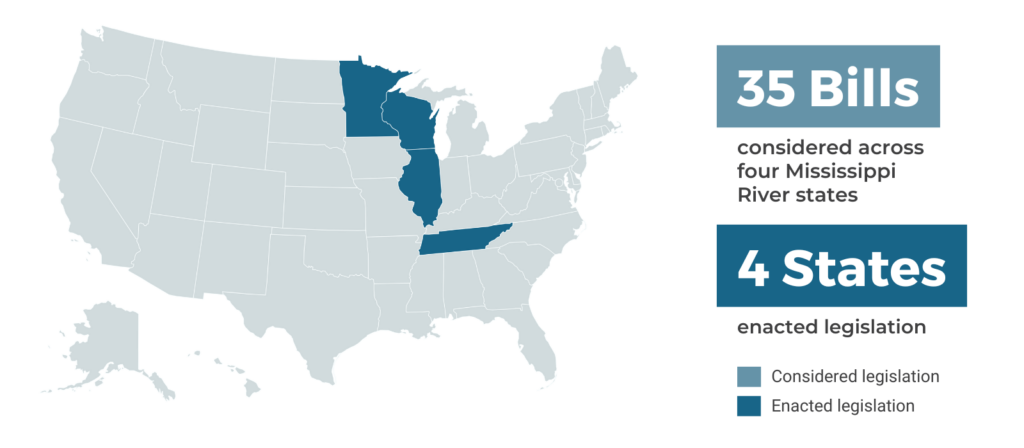
After that, the first panel of the day was focused on sustainable agriculture and alternative crops. First Peter LaFontaine, the Agricultural Policy Manager for Friends of the Mississippi River spoke on the need for new and emergent crops to build market-based approaches to sustainable agricultural needs. Then Erin McKee, the Community Food Systems Program Manager for the Institute for Agriculture and Trade Policy spoke on how state policies can be used to support the next generation of small-scale and diverse farmers.
Policy Options for States
- Minnesota S.F.3271 Certain agricultural organizations grant (introduced in 2022) – Appropriates funds intended for grants to Minnesota organizations to develop enterprises, supply chains, and markets for early-stage commercial development of continuous living cover crops and cropping systems, including regenerative poultry silvopasture systems, Kernza perennial grain, winter camelina, and elderberry.
- Minnesota H.F.4908 Emerging Farmers Bill (introduced in 2023) – Introduces several modifications and additions to Minnesota’s agricultural policies, focusing on support for beginning and limited-resource farmers. The bill defines “limited-resource farmer” as one experiencing limited land or market access and adjusts the eligibility criteria for various grants and tax credits to prioritize these farmers.
Attendees then transitioned to a discussion around green infrastructure and the benefits it can bring, especially to urban areas, working to reduce flooding and runoff. First Janet Pritchard, the Director of Water Infrastructure Policy at the Environmental Policy Innovation Center (EPIC) spoke on how states can finance green infrastructure using the Clean Water State Revolving Fund (CWSRF). Afterwards Joey Algier, the Narrative Strategy and Education Manager for the Water Collaborative of Greater New Orleans spoke on the importance of centering communities in the decision-making process to develop storm water utilities.
Policy Options for States
- Vermont H.777 An act relating to the Clean Water State Revolving Loan Fund (enacted in 2018) – Authorizes a CWSRF Sponsorship Program to utilize those federal funds for clean water projects to protect and improve the quality of waters of the State.
- New Jersey S.1073 Clean Stormwater and Flood Reduction Act (enacted in 2019) – Authorizes municipalities, counties, and certain authorities to establish stormwater utilities to properly operate, maintain, repair, and improve their storm sewer system as necessary.
- Connecticut H.B.6441 An Act Concerning Climate Change Adaptation (enacted in 2021) – Allows municipalities to establish or designate a stormwater authority to manage stormwater systems. The authority’s responsibilities include developing stormwater management programs, providing public education, administering the program, defining district boundaries, and recommending fees on real property to fund these activities.
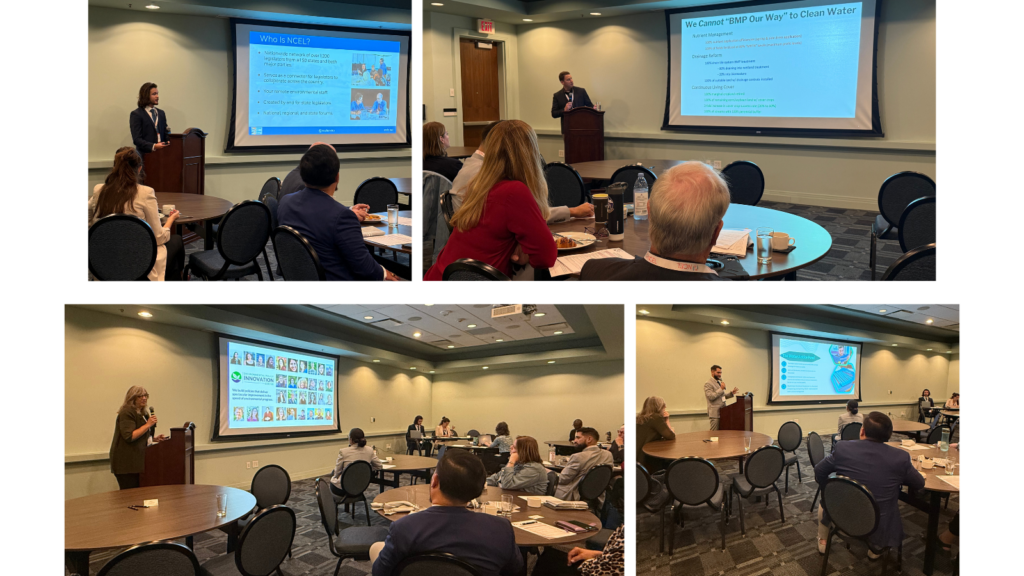
After lunch, the Brian Vigue with the Great Lakes Audubon Society highlighted the impacts of the Sackett Supreme Court decision on states and provided examples of what states can do to better protect wetlands. An acre of wetlands can hold one million gallons of water so they serve both as an incredible ecosystem but also a major form of flood protection. Attendees then heard from Kathryn Hoffman the CEO of the Minnesota Center for Environmental Advocacy, who broke down what the Chevron Deference was and what it means now that the Supreme Court overturned it.
State Policy Options
- Wisconsin S.B.222 Relating to: a pre-disaster flood resilience grant program (enacted 2024) – Establishes a pre-disaster flood resilience grant program. This program, administered by a designated division, aims to provide grants to local governmental units, including cities, counties, and tribes, to identify flood vulnerabilities, improve flood resilience, and restore hydrology in flood-prone areas. The program will encourage local governments to restore and conserve wetlands and undertake other proactive strategies before flooding events occur.
- Indiana S.B.246 Assessment of wetlands classified as wildlands (enacted 2024) – Allow wetland areas as small as 0.5 acre to be classified as wildlands for purposes of tax assessment, thus creating a strong incentive for farmers and developers who own wetlands to preserve them, and expand an existing program to create a voluntary incentive for wetland preservation. This bill would give the wetland property owner lower property taxes.
Then Janet Pritchard from EPIC and David Pelikan the Climate Resilience Program Manager at the Theodore Roosevelt Conservation Partnership shared federal funding opportunities that are available to states such as the Clean Water State Revolving Funds and the STORM Act. Janet Pritchard walked legislators through how the State Revolving Funds operate and how states can access them. David Pelikan explained the specifics of the STORM Act, how it works, which states have already authorized access to it, and how other states can apply for it.
State Policy Options
- Tennessee S.B.2080 Resilient Tennessee Revolving Loan Fund Act (enacted 2024) – Establishes the Resilient Tennessee Revolving Loan Fund to enhance disaster mitigation and resiliency efforts within the state. The fund is designed to receive and manage federal funds from the Safeguarding Tomorrow through Ongoing Risk Mitigation (STORM) Act, as well as state appropriations, investment earnings, loan repayments, and other sources.
- Louisiana H.B.1052 Establishes the Hazard Mitigation Revolving Loan Fund (enacted 2022) – The fund will consist of federal grants, state funds, loan repayments, and interest earned. It will provide financial assistance for eligible recipients, including political subdivisions and private entities, for mitigation efforts, administrative costs, and other federally consistent expenditures.
The day wrapped up with a presentation and discussion about the opportunities that exist for various Mississippi River agreements. Alexandra Campbell-Ferrari, CEO and co-founder of the Center for Water Security and Cooperation spoke on the possibility of creating an interstate Mississippi River Compact that would help states better manage the Mississippi River in a holistic manner. She shared a roadmap of how such an agreement could be developed and the role that state legislatures would play in its creation.
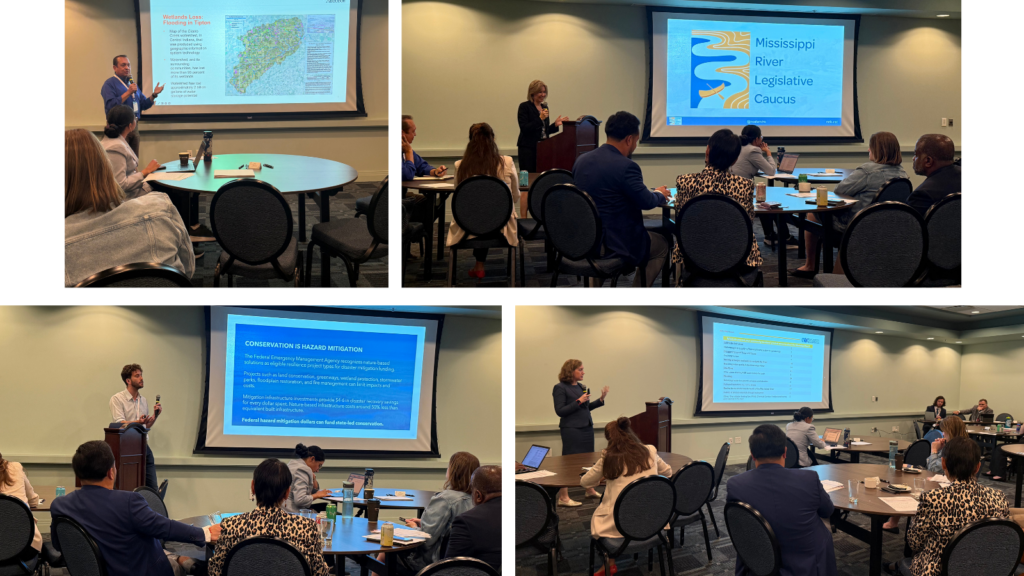
Legislators enjoyed dinner at Owamni by the Sioux Chef, an Indigenous restaurant. They prioritize purchasing from Indigenous food producers and remove all colonial ingredients like wheat flour, cane sugar, and dairy.
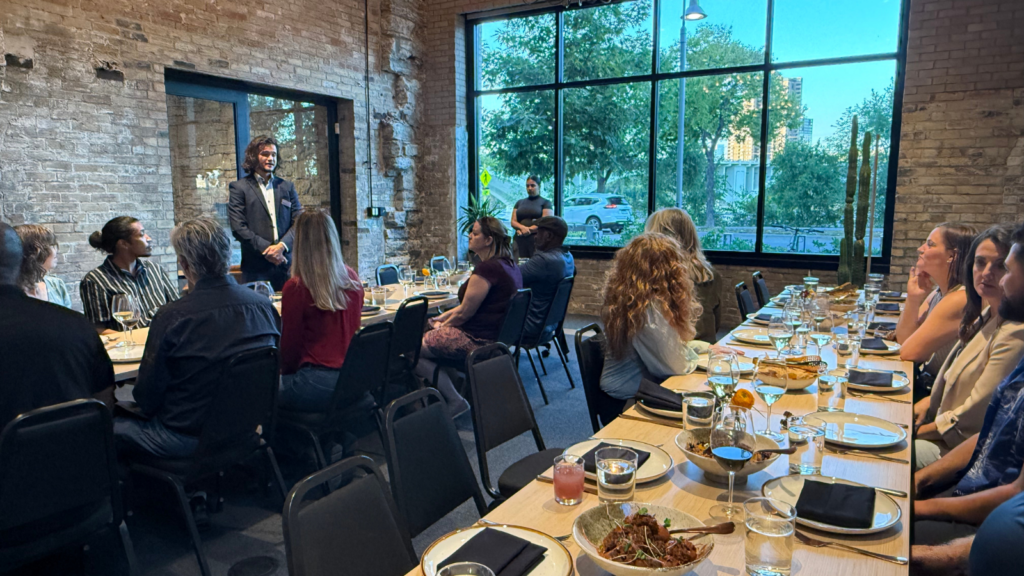
Day Two
The second day was spent out on the water, recreating along the River that we spent the previous day discussing how to protect. We were led by Wilderness Inquiry whose mission is to connect people of all ages, backgrounds, identities, and abilities through shared outdoor adventures so that all people can equitably experience the benefits of time spent in nature. Before getting on the water, there was a moderated panel discussion between Erika Rivers, the Executive Director of Wilderness Inquiry and Representative Sydney Jordan of Minnesota’s 60A District on the importance of access to the outdoors and how state legislatures can support access for all through key policies.
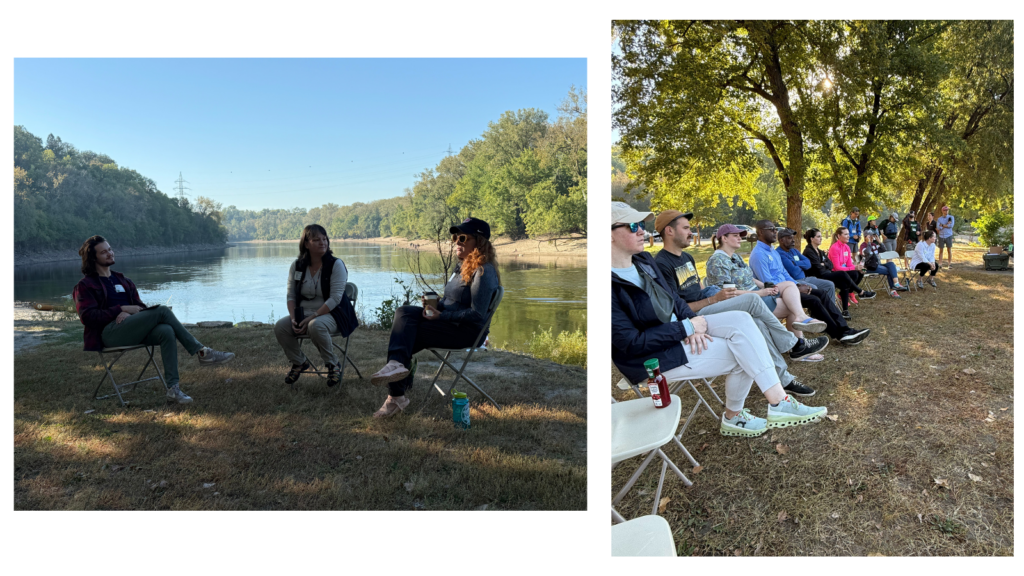
Legislators then loaded onto two 10-person canoes and enjoyed a paddle down the river.
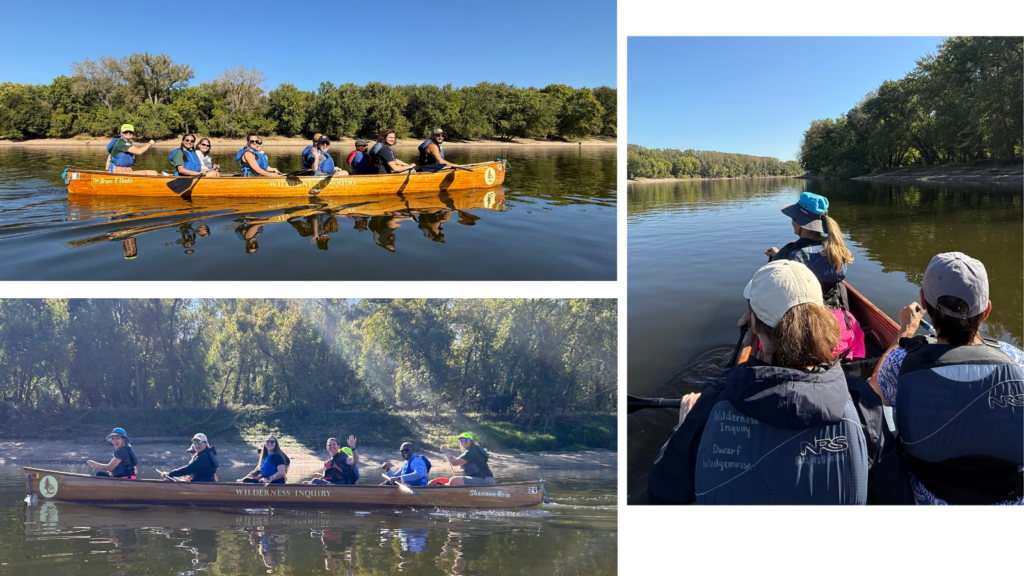
Thank you to all who attended and made the 2024 MRLC Forum a success!
Looking Ahead to the 2025 Legislative Session
As we look toward 2025 legislative sessions, MRLC staff are committed to providing the resources and capacity Mississippi River legislators need to address the issues facing the watershed. Through regional convenings such as the Annual Forum and our River Tours, in-state meetings, and policy updates, we are here to help. If you are interested in learning more about MRLC’s work or becoming a member, contact Chris Askew-Merwin.